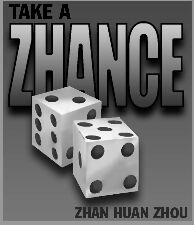
Spring 2000
Fall 1999
Winter 1999
Fall 1998
Spring 1998
Fall 1997
©2001 Zhan Huan Zhou
Updated Feb-10-2001
Please email me for comments, corrections, or suggestions.
What You Know, Part III
©2001 Zhan Huan Zhou, Winter 2001, Issue 3
I can hear Rene Descartes laughing in his grave as I discuss the second of the four postulates: "You know that you don't know." You see, Descartes was a funny French fellow with fantastical ideas. One day he had a meditation where he suddenly realized that he didn't know anything at all. He claimed that all our knowledge came from our senses, but since our senses sometimes deceive us, we do not know anything for certain because we are never sure when our senses are being deceived. He likened this deception to a dream where experiences seem real when in fact they are only perceived. He said that the only things we can know for certain are ones that it are unimaginable that it could be otherwise. Although some of Descartes claims may seem unreasonable, he does conjure up an interesting idea. What he stumbled across was actually quite cool. He knew something of great importance, something that would shake the foundations of western philosophy for all that followed. Descartes knew that he didn't know.
In the second year, you wound up in the same boat as Descartes because "You know that you don't know." You woke up from the bad dream known as 'dumb frosh.' You woke up from the ignorance of not knowing that you didn't know. You realized how ignorant you were.
The mindset of "You know that you don't know" contrasted vastly to "You don't know that you don't know." In first year, you went to lectures thinking that you actually knew something. In second year, it was completely different. Your expectations of the lecture had changed so much. Instead of going to the lecture expecting to know something, you went with the expectation that the material was not only going to be new and foreign, but that it would be hard. You knew that you didn't know the material. It was actually quite amusing testing the extent of your ignorance. You realized that there is so much in the world that you don't know. You found out that engineering involved more than just double integrals and free body diagrams. The best part was when you realized you had been doing things the long and hard way in first year. In second year they taught you how to solve the same problem in first year in half the time. Boy did you feel stupid.
We've all heard of Shakespeare's "To be, or not to be." At Waterloo, especially in engineering, we grossly misinterpret it as "2B, or not 2B." There is a reason for this, though: second year is tough, not just academically, but mentally. Many factors run through a student's mind at this time. It seems after two years of education, you still haven't learned anything practical in the engineering discipline you are studying. It seems that all the mathematics takes out all the cool stuff you thought you would be doing. You question if it is even worth the $3000 per term to keep on studying. And to top it all off, you know that you don't know. Maybe it would have been better to stay in that bad dream or perhaps not know that you don't know. When, you ask yourself, will I finally know something? I answer by saying don't give up. The answer is coming in the next issue when I discuss the third postulate "You don't know that you know."